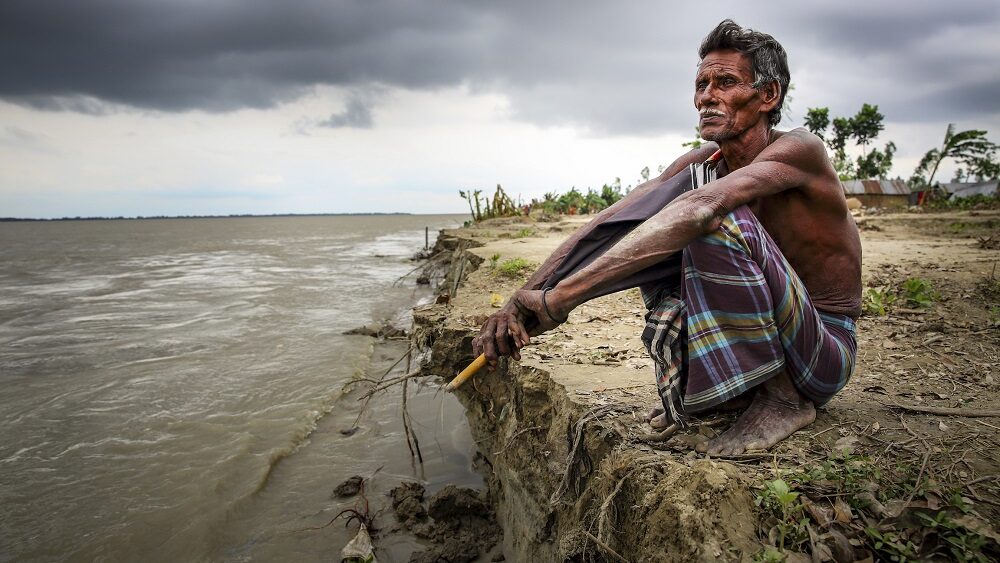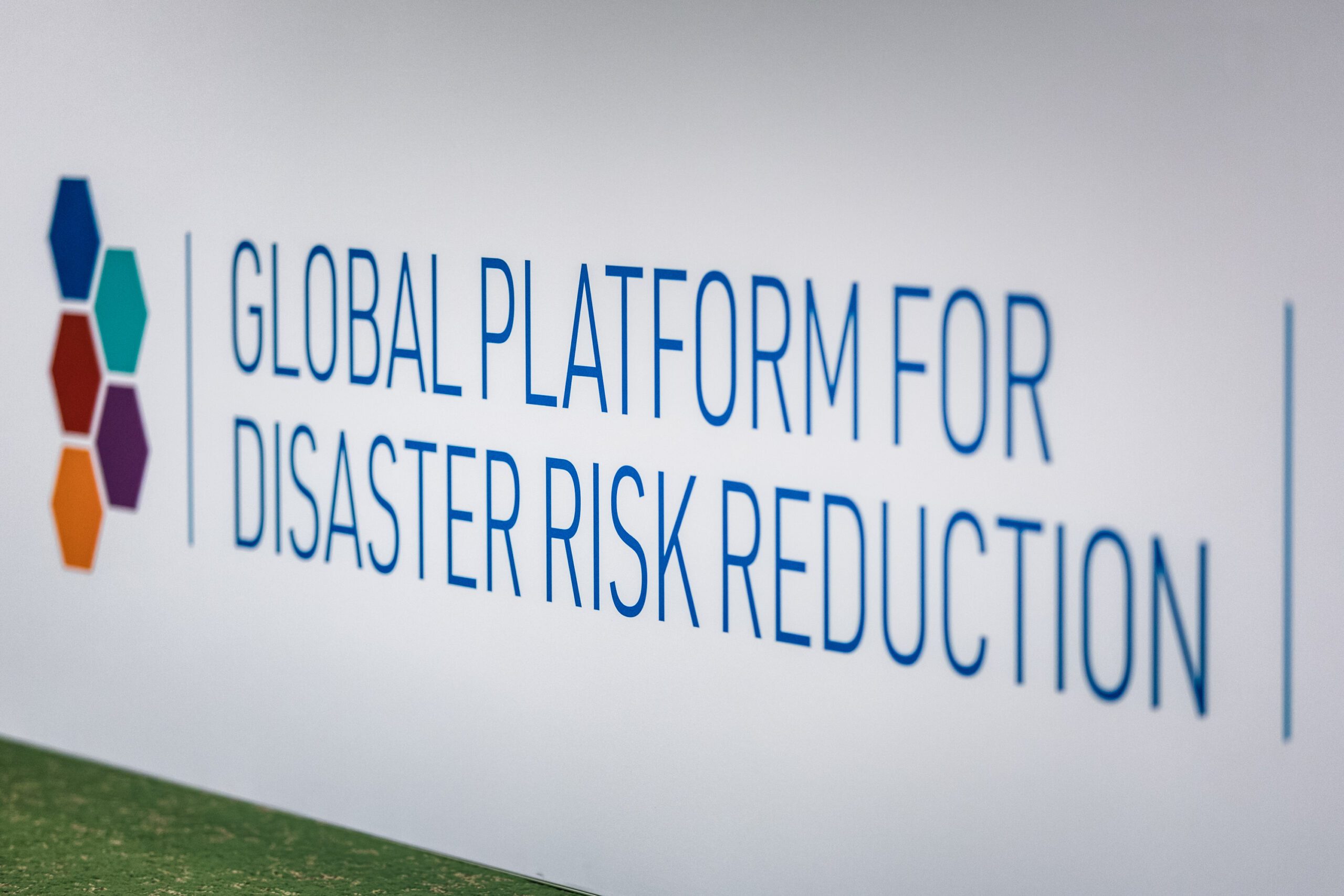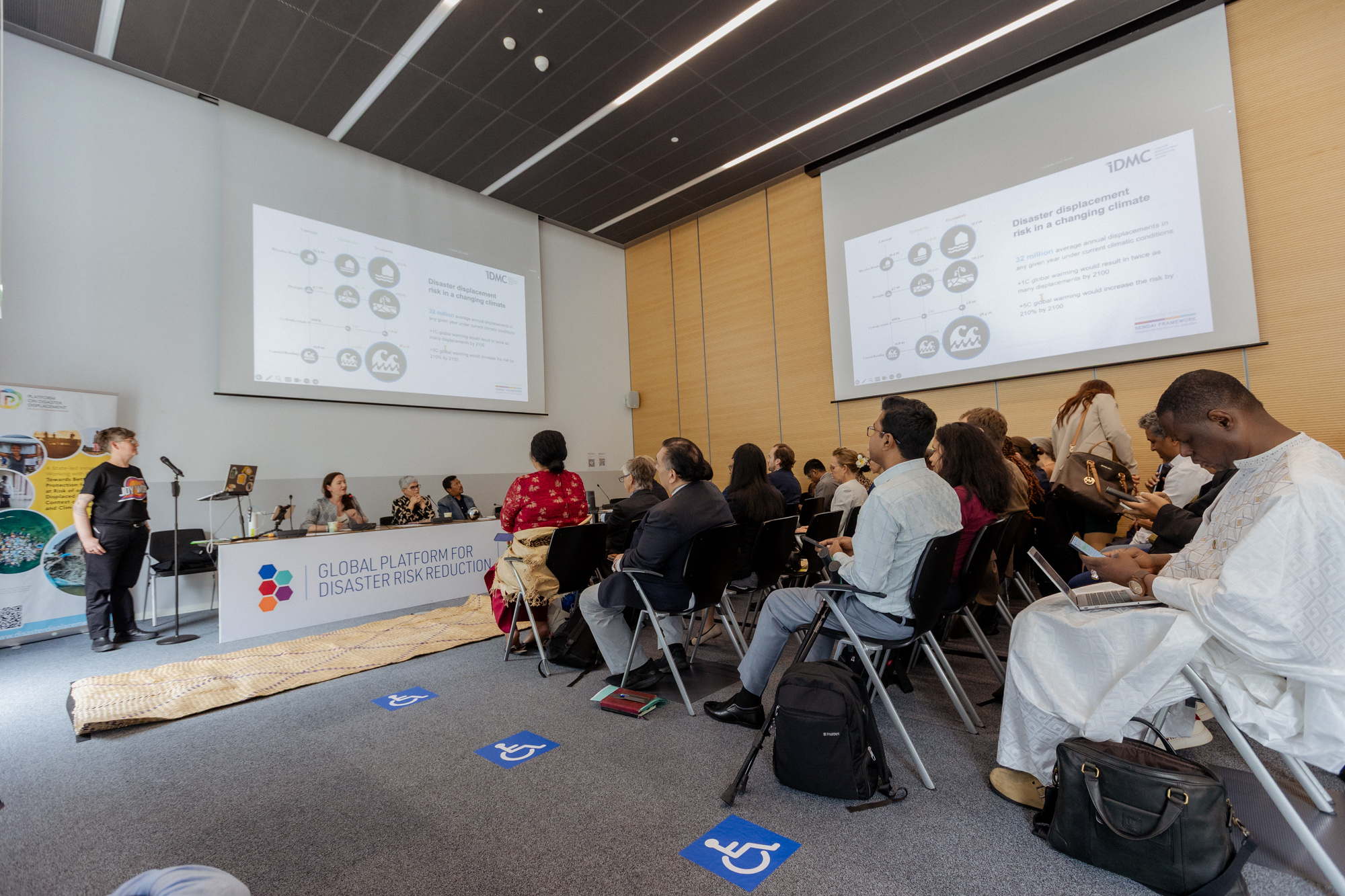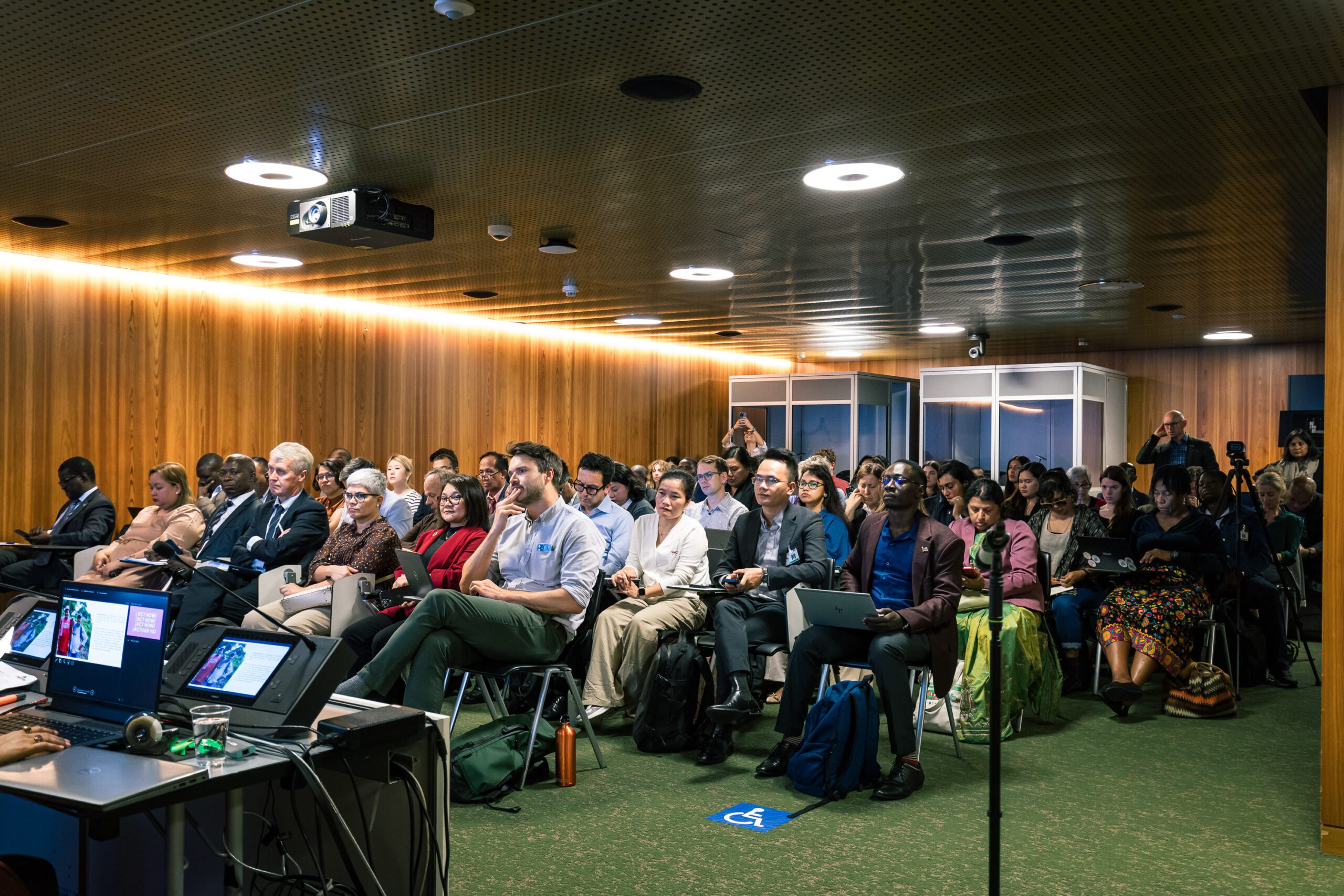Keeping tabs on disaster displacement in the climate change negotiations and within the Global Compact for Migration

The international community have committed to promote effective coordination and coherence in the implementation of global policy agendas, but there is often criticism of divided, or siloed, approaches that fragment action and communication. This has long been the case with migration action, on the one side, and climate change action, on the other. In December 2018, the Intergovernmental Conference that will adopt the Global Compact for Safe, Orderly and Regular Migration (GCM) and the 24th Conference of the Parties (COP24) on Climate Change, that will consider recommendations on integrated approached to avert, minimize and address displacement in the context of climate change, will showcase possibilities and provide opportunities for enhanced policy coherence and integration.
On October 11, 2018, the Platform on Disaster Displacement, alongside Refugees International, Oxfam International, ACT Alliance and the Norwegian Refugee Council, organized a webinar to include a variety of stakeholders, across time zones, in order to discuss the many links between the two international conferences and motivate joint actions among stakeholders across disciplines.
The Webinar began with an introduction to the newest Intergovernmental Panel on Climate Change (IPCC) report, which outlines what the world will look like if global temperatures rise to 1.5 degrees Celsius above pre-industrial levels instead of 2 degrees. Although the report makes limited references as to how such temperatures will affect displacement, one can confidently conclude the more that the international community can mitigate greenhouse gases and keep the global temperature down, the more it will reduce the number of people exposed to climate and disaster risks, poverty and vulnerability. An increase in global temperatures by just half of a degree could have negative impacts on hundreds of millions of people. These negative impacts are already happening, which is especially clear as even if all emissions ceased today, some of the adverse effects would still happen, just to a lesser degree.
While the adverse effects of climate change is not the only reason that might force or lead to one’s decision to move, it certainly has an impact – one that is recognized in the final text of the Global Compact for Safe, Orderly and Regular Migration. The process began in 2016 with the New York Declaration, which took a broad look at large movements of people and made commitments to ensure safe, orderly and regular migration and human mobility for all, regardless of the drivers that compel or make people move. The final text of the GCM addresses climate change as a driver of migration and recognizes the need to assist and protect people displaced as a result of the adverse effects of climate change.
In 2015, decisions at the Climate Change Conference in Paris mandated that a Task Force be established to make recommendations on integrated approaches to avert, minimize and address displacement related to the adverse effects of climate change. In September 2018, the Task Force on Displacement delivered on its mandate by presenting its recommendations to the Warsaw International Mechanism on Loss and Damage Executive Committee, they will soon be considered and negotiated at the Climate Change Conference (COP24) in December. The recommendations open up an opportunity to create links with discussions happening at the GCM. The recommendations invite different levels of stakeholders to prevent and address displacement in a variety of ways. It also calls for action to strengthen coordination, coherence and collaboration across relevant UNFCCC and Paris Agreement bodies, institutional arrangements, programs and platforms. Many of the recommendations are also directed at efforts to strengthen understanding and assess risk and vulnerability, including capacity to map, understand and manage human mobility related to the adverse effects of climate change.
Ultimately, this discussion in the Webinar aimed to show how Civil Society can be involved and work with a range of stakeholders towards joint action. One example of this is through the Advisory Group on Climate Change and Human Mobility, which provides technical support to UNFCCC Parties on climate change-induced population displacement, migration and planned relocation. This group works together to provide common messaging for climate change negotiators, submit research findings to the bodies under the Convention and organize side-events along with other stakeholders. The Advisory Group recognizes the Task Force on Displacement is an important landmark and supported by the Advisory Group, human mobility must also be considered in mitigation and adaptation negotiations.
In order to advocate efficiently and effectively and on behalf of those displaced by disasters and as a result of the adverse effects of climate change, stakeholders involved in both climate change and migration areas of work need to come together in support of these two processes and explore opportunities to join forces moving forward.
Here is a non-exhaustive list of events on disaster displacement related topics that are scheduled to take place during the Migration Week in Marrakesh, and the 24th Conference of the Parties (COP24) on Climate Change.
Intergovernmental Conference to adopt the Global Compact for Safe, Orderly and Regular Migration
Side-events: Marrakesh Morocco 8-9 December 2018
Side events will take place at Palmeraie Golf Palace and will require either a GFMD or conference badge.
| Organizer(s) | Title/theme | Date/Time | Room |
|---|---|---|---|
| International Center for Comparative Environmental Law | Law, Migration, Environment and Security | Saturday, 08 December Full Day | Faculty of Law of the University of Marrakech (not at the Palmeraie) |
| IOM - co-organizers TBC | Addressing the humanitarian consequences of large movements – Taking stock and looking ahead two years on from the New York Declaration | Saturday 08 December 10:30-12:30 | Orangeraie |
| Intergovernmental Authority on Development (IGAD) in collaboration with its partners: IOM, PDD, the Swiss Government and Government of Germany. | ‘’Role of International Cooperation and Partnerships in Implementing the GCM - Mechanisms and Best Practices from the IGAD Region’’ | Sunday 09 December 8:00-10:00 | Palmeraie |
| International Center for Comparative Environmental Law | Law, Migration, Environment and Security | Sunday 09 December 8:00-10:00 | Roseraie |
| International Federation of Red Cross and Red Crescent Societies (IFRC) | Saving lives and ensuring safe access to basic services: Partnerships in the humanitarian aspects of migration | Sunday 09 December 10:30-12:30 | Orangeraie |
| Co-organized by OHCHR together with Member States (TBC), UNHCR (TBC) and UNODC (TBC) | “Migrants in vulnerable situations: National practice for admission and stay based on human rights and humanitarian grounds” | Sunday 09 December 13:00-15:00 | Palmeraie |
| UAE, IOM, Migrant Forum Asia | Regional Dimensions in the Implementation, Follow-up and Review of the Global Compact for Migration | Sunday 09 December 13:00-15:00 | Atlas 1 |
| European Commission’s Joint Research Centre (JRC) and the International Centre for Migration Policy Development (ICMPD) | From theory to practice: innovative uses of evidence for forward-looking migration policies | Sunday 09 December 15:30-17:15 | Palmeraie |
| UN Environment, International Organization for Migration (IOM), Platform on Disaster Displacement, UN Refugee Agency (UNHCR), UN Trust Fund for Human Security and the Norwegian Refugee Council | Addressing natural disasters, adverse effects of climate change and environmental degradation – solutions for human mobility and human security | Sunday 09 December 17:30-19:00 | Palmeraie |
United Nations Climate Change Conference (COP24)
Side-events: Katowice Poland 3-14 December 2018
| Organizer(s) | Title / Theme | Date | Time / Room |
|---|---|---|---|
| Stockholm International Water Institute (SIWI), World Water Council | Shocks and Stressors: Water's essential role in addressing climate change, DRR and human mobility | Tuesday, 04 Dec 2018 | 11:30—13:00 Warmia |
| Norwegian Refugee Council (NRC), Arab Network for Environment and Development (RAED), Coastal Association for Social Transformation Trust (COAST Trust) | Displacement, human mobility and climate change - 2 years later | Tuesday, 04 Dec 2018 | 15:00—16:30 Pieniny |
| Unitarian Universalist Association (UUA), NPO Tuvalu Overview (TOV), Refugees International | Climate-Forced Displacement(CFD): Progress to Advance Human Rights and Justice Since Paris Agreement | Tuesday, 04 Dec 2018 | 16:45—18:15 Pieniny |
| COAST Bangladesh | Press briefing: CSO Expectations for COP24 | Wednesday, 05 Dec 2018 | 13:00—13:30 COP24] Press Conference Room Katowice Area F – Theater |
| UNFCCC: Warsaw International Mechanism for Loss and Damage Executive Committee | WIM Task Force on Displacement: Recommendations for Integrated Approaches on How to Avert, Minimize and Address Displacement and Next Steps | Thursday, 06 Dec 2018 | 13:15—14:45 Pieniny |
| UNFCCC | Building capacity for integrating human rights into climate action | Friday, 07 Dec 2018 | 13:15—14:45 Pieniny |
| Carre Geo & Environnement (CGE), Centre International de droit Comparé de l'Environnement (CIDCE), Marshall Islands, Responding to Climate Change (RTCC), Taiwan Research Institute (TRI) | Implementation of Article 8 of the Paris Agreement and Decision 49/CP21 | Saturday, 08 Dec 2018 | 11:30—13:00 Narew |
| Global Ocean Forum | Adaptation and Population Displacement (as part of Oceans Day) | Saturday, 08 Dec 2018 | 14:30—13:30 Japanese Pavillion |
| Sierra Club & UN Women | Women on the Move in a Changing Climate | Saturday, 08 Dec 2018 | 15:00-16:00 UN DESA Event Space |
| Development and Climate Days | "Five Years In: What has the Warsaw International Mechanism Achieved and Looking Ahead, Where Can We Go from Here? | Saturday, 08 Dec 2018 | 16:00 - 17:20 PLACE: Hotel Diament Arsenal in Katowice |
| United Nations | One UN for Climate-Compatible Cities: Resilient cities driving risk-informed sustainable development | Monday, 10 Dec 2018 | 13:15—14:45 Bug |
| Office of the United Nations High Commissioner for Human Rights (OHCHR) | Voices from the Climate Frontlines: Protecting the rights of the most vulnerable and furthest behind | Monday, 10 Dec 2018 | 18:30—20:00 Bug |
| Stichting Climate Action Network South Asia (CANSA), ACT Alliance - Action by Churches Together (ACT Alliance), Bread for the World (BfdW), Sustainable Development Policy Institute (SDPI) | Policy response to address Climate Induced Migration in South Asia | Tuesday, 11 Dec 2018 | 11:30—13:00 Bieszczady |
| International Organization for Migration (IOM) | Climate-induced human mobility: taking stock of 3 years of discussions under the UNFCCC | Tuesday, 11 Dec 2018 | 13:15—14:45 Warmia |
| Potsdam Institute for Climate Impact Research (PIK), Stiftung Mercator Foundation | Planetary Boundaries and Global Commons - managing risks and solutions | Tuesday, 11 Dec 2018 | 15:00—16:30 Pieniny |
| Secretariat of the Pacific Regional Environment Programme (SPREP), Micronesia (Federated States of), Tonga | Living in the face of climate change: From the Pacific islands to the world | Tuesday, 11 Dec 2018 | 18:30—20:00 Bug |
| Women's Earth and Climate Caucus (WECC), Amazon Watch, California College of the Arts (CCA), Ithaca College | Women for Climate Justice Leading Solutions on the Frontlines of Climate Change | Wednesday, 12 Dec 2018 | 11:30—13:00 Bieszczady |
| European Commission, DG Climate Action | Get ready for climate change: Today’s European adaptation policies and outlook towards 2050 | Thursday, 13 Dec 2018 | 16:30—18:00 Brussels |
Keep up to date with the latest information about the Global Forum on Migration and Development Summit Meeting, the UN Climate Change Conference and the Intergovernmental Conference that will adopt the GCM
Download the list of disaster displacement related topics at Migration Week in Marrakesh
 Loading...
Loading...
Download the list of disaster displacement related topics at the UN Climate Change Conference in Katowice
 Loading...
Loading...
Download the final draft of the Global Compact for Safe, Orderly and Regular Migration
 Loading...
Loading...
Download the PDD leaflet
 Loading...
Loading...
Download the Protection Agenda in English
